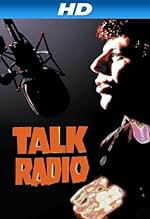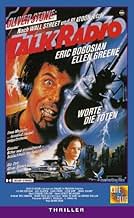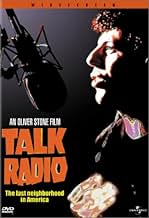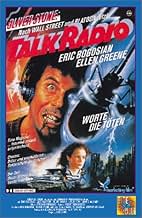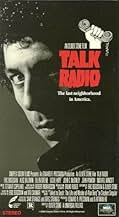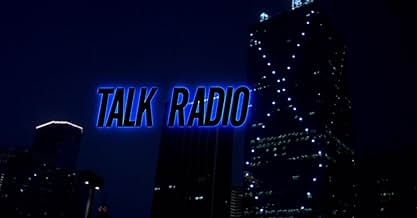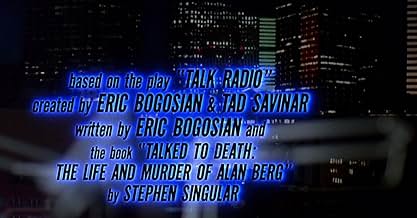Un presentador maleducado y despectivo se ve abrumado por el odio que rodea a su programa justo antes de que se emita a nivel nacional.Un presentador maleducado y despectivo se ve abrumado por el odio que rodea a su programa justo antes de que se emita a nivel nacional.Un presentador maleducado y despectivo se ve abrumado por el odio que rodea a su programa justo antes de que se emita a nivel nacional.
- Dirección
- Guión
- Reparto principal
- Premios
- 3 premios y 5 nominaciones en total
- Woman at Basketball Game
- (as Anna Levine)
- …
Reseñas destacadas
Talk Radio follows a self-indulgent, dysfunctional, determined, hysterical, outrageous and perplexing radio host, named Barry Champlain who hosts a controversial late-night radio show in Dallas. Quickly becoming well known for his bold and quirky air-presence he becomes a late night sensation, whereby depraved junkies, delinquents, racists, sociopaths, sickos, perverts and morons call in to be ridiculed on air. The film shows the rise and fall of the man's career, carefully making an accurate portrayal on freedom of speech. Originally adapted from a stage-play, the film attaches itself to the theatre theme that it was originally built around, wonderfully conveying the film's fierce nature.
With the ferocious energy and non-stereotypical air, Talk Radio brings all the hilarity behind "crass media". It remains even more poignant today than it was in the late '80s. The film goes into depth studying the likes of arrogance, self-obsession, offensive behaviour, controversy, hypocrisy and ignorance. The film shows through a controlled manner how it is good to have a personal opinion and freedom of speech, yet it is something that should be used wisely rather than shamefully blunt. Stone tries to show how freedom of speech is a crucial importance in life, but is something that we should be wary and cautious about. The film asks the question of "is our main protagonist just the same as the sad people who call up the show?"
Stone fabulously creates the film's key set-piece (the radio station) with an ambition and cold atmosphere. He then succeeds in capturing the isolation, fear, ambiguity and the dangerous emotions that are built up at the radio station. Eric Bogosian is perfectly cast as the isolated, self-absorbed and complex genius, Barry Champlain. He fits the role perfectly letting off his lines with such enthusiasm, urgency, perplexity, brusqueness and ultimately the bold hilarity of his offensive nature. The performance brims with spark, which was evidently robbed of an Oscar nomination. His voice suits the character, being that a primary element of a radio host and his power of acting along with tragedy and comedy works brilliantly.
There is a strong use of editing in Stone's films and Talk Radio boasts some of his cleanest, most rhythmic editing. He uses beautifully controlled camera techniques, which differ from being calm to suddenly becoming turbulent. There is a vibrant energy behind the film, with its raw and wonderfully delightful script working as a centre-piece for the greatness of the film. The striking and virtuous cinematography stands out in the moments inside and outside the studio, most impressively capturing the city at night. Not forgetting the hauntingly heartbreaking and yet darkly funny climatic "spiral to decline" is ultimately remarkable cinema.
Talk Radio is an essential modern masterpiece, I am certain you will be surprised by just how great it really is. I highly recommend Talk Radio for anyone interested in media or film. Talk Radio is a fine example of top-notch, intellectual and insightful entertainment, which still packs a well-earned wakeup call. Finally, if it was not for Eric Bogosian the film would not be the fun, delightful and enduring masterpiece it is today.
While after seeing the film I felt curious as to see how it would've been done on stage (I'd imagine it was a one-man show, as Bogosian has had several on the side), the direction of the film is phenomenal. Stone has been known, almost typecast, as a director who loves quick cuts, the limitless effects of montage, and effects with the styles of camera-work and other little tricks, that give his films in the 90's a distinctive, almost auteur look. But in the 80's he had this energy and feverish quality to the look of the film, and wasn't as frenzied as the other films. In order to add the proper intensity that is within the studio and head-space of Barry Champlain, he and DP Robert Richardson make the space seem claustrophobic at times, gritty, un-sure, and definitely on edge. The scenes in the middle of the film, when Barry isn't in the studio, are fairly standard, but the style along with the substance in the radio scenes is among the best I've seen from the Stone/Richardson combination.
And one cannot miscalculate the performance of Bogosian, who can be obnoxious, offensive, angered, passive, and everything that we love and hate in radio show hosts. There is also a funny, near distracting supporting role for Michael Wincott as Kent/Michael/Joe, who prank calls him one night, and the next gets invited to the studio. These scenes are a little uncomfortable for a viewer, but it does get very much into the subculture head-space of the 80's that Barry is as intrigued as he is critical of. The stoner may not 'get it', but as he says to him "it's your show". Indeed, it's hard to cover everything that goes on within the talk, and there is a lot of it. But it's never boring, and like Champlain himself, it's not easy to ignore. And when Bogosian goes into his climactic tirade on air, with the background panning around in a continuous 360 spin, it becomes intoxicating, and a reason why freedom of speech is so powerful.
Stone has been synonymous as a filmmaker of hot-button issues, who takes on subjects that were or still are controversial, and gives them a life-force that isn't always great, but is all his own. Here his skills and ambitions don't get in the way of Bogosian's- it's boosted, if anything, making an extremely skilled vision of what is essentially a near one-man show, which in and of itself is already well-written.
Written by and starring Eric Bogosian, Talk Radio tells the story of an opinionated radio phone-in host who upsets the wrong kind of listener. The film is important, and has much to say on the issues of free speech and just how free it should be, and you can easily tell that it started life as a stage play. Know what you're getting into before you sit down to watch it and you'll be fine.
There isn't much to the acting really as Bogosian pretty much steals the film, he wrote and is given licence to rant, I couldn't take my eyes off him and that was part of the fascination many of the listeners had; the people who hated him wouldn't turn off in-case they missed something.
Not for everyone, but a very good drama and overall a very good film.
Talk Radio begins with a montage of tall, towering buildings in a business based area of Dallas, Texas. The skyscrapers are shot from a ,ow angle and tower over the viewer plus everything else in the general vicinity as this voice of one man tears through the images, belting out statements and information on items as these monolithic buildings dominate out screen. They are the very physical representation of capitalism, while the voice of what we learn to be a radio DJ is the oral representation of the free west; personal speech and opinions on anything and everything. Stone will finish his film in the exact same manner in which he started it, although the film is anything but a circular journey of any sort as the characters undergo monumental changes in both what they witness and their general livelihood. Rather, the shots of the buildings act as an anchor around which the study is observed. The ideologies and ideas of a way of life exist; people subscribe to them, but it does them more harm than good; before the re-establishment that this proud way of life still exists and will continue to exist in churning out the sorts of people on display in the film until someone or something drastically changes things.
The DJ is Barry Champlain, a man with a radio show on a local Texan station dealing with just about anything. Champlain's somewhat carefree attitude to some pretty explosive content is established when he flies from one call with a bigoted man whom recently visited a Holocaust museum to a young drug addict whose girlfriend has supposedly overdosed and onto both the berating and mocking of a pizza shop. To us, the content comes across as quite shocking; to these people, everything seems to be business as usual which plants some serious seeds of both doubt and horror within the minds of us, the newcomers to all of this.
What Barry's show is about, nobody ever seems to really establish: everything and nothing. Indeed, time is taken in the form of either jingles or dialogue that the shows immediately pre and post Champlain's show are on specific subjects; gardening, for instance, and are hosted by calm speaking and methodical people whom, I'm sure, do not flit from one random or extreme to another all the time raising the stakes. One wonders what Barry's jingle is, the kind that plays around about lunch time during someone else's' show: "Coming up later, the Barry Champlain show! Featuring the village idiot and psychotic drug abusers!" Indeed, his show's introductory piece carries a matter-of-fact tone, a shouting at the audience, as a loud rock track accompanies it.
Barry's success arrives in the national syndication proposal. It's born out of confrontation and a relationship built on the contempt he has for his listeners and that they have for him. The furthering of the material and the upping of the stakes ought to call into question just how far they think they can take this, and whether this progressing down a track for sake of entertainment is really worth it. It is when the show reaches this level of broadcast that Barry seems to come unstuck for the first time in his broadcasting life, when a supposed serial rapist calls in and leaves mostly everyone slightly stunned. It's at this point the camera pauses on Barry, and by way of depth of focus, encompasses those same looming, towering buildings the film began with which stand outside of the window, directly behind Barry. They remain tall and proud. Specifically, of the ideologies they've been built on and this furtherance of freedom of speech in broadening Barry's show nationwide as one man climbs his profession's ladder suddenly clashes with the sort of content that's being offered. Everything reaches a point too far, and that with freedom, ought to at least come a sense of clarity rather than a mere revelling.
Oliver Stone made Talk Radio right in the middle of both a fascinating and explosive period of film-making he had in the late 1980s. In this time, he produced a series of really well received films in a pretty short space of time; beginning with one of my favourite war films in Platoon before continuing with the quite brilliant Wall Street and eventually finishing with 1991's JFK. One might even say that this run continued on into the mid-nineties with Natural Born Killers. Talk Radio is like its lead character in the sense it's loud, booming, stark and confrontational. It isn't anti-capitalism, as much as it is focused on drawing a line between what is perceived as entertainment and what is just going too far for sake of popularity and riches. Talk Radio is certainly a film that sticks in the memory.
¿Sabías que...?
- CuriosidadesEric Bogosian's play "Talk Radio", on which this film is based, was a finalist for the Pulitzer Prize.
- PifiasWhen Barry Champlain says that he's going to punish his listeners by playing the Bee Gees' song - Saturday Night Fever, ten times in a row. While they had a monster hit with "Night Fever" there is no such song as "Saturday Night Fever." The record they actually play is Disco Inferno by The Tramps. This may be intentional due to copyright issues; however, the track is on the OST for Saturday Night Fever.
- Citas
Barry: I should hang; I'm a hypocrite. I ask for sincerity and I lie. I denounce the system as I embrace it. I want money and power and prestige: I want ratings and success. And I don't give a damn about you, or the world. That's the truth: for that I could say I'm sorry, but I won't. Why should I? I mean who the hell are you anyways you... audience! You're on me every night like a pack of wolves because you can't stand facing what you are and what you've made! Yes, the world is a terrible place. Yes, cancer and garbage disposals will get you. Yes, a war is coming. Yes, the world is shot to hell and you're all goners. Everything's screwed up and you like it that way don't you? You're fascinated by the gory details. You're mesmerized by your own fear. You revel in floods and car accidents, unstoppable diseases. You're happiest when others are in pain. That's where I come in, isn't it? I'm here to lead you by the hands through the dark forest of your own hatred and anger and humiliation. I'm providing a public service. You're so scared. You're like a little child under the covers. You're afraid of the boogeyman but you can't live without him. Your fear; your own lives have become your entertainment. Next month, millions of people are going to be listening to this show and you'll have nothing to talk about! Marvelous technology is at our disposal, and instead of reaching up to new heights, we're gonna see how far down we can go! How deep into the muck we can immerse ourselves! What do you wanna talk about, hm? Baseball scores? Your pet? Orgasms? You're pathetic. I despise each and every one of you. You've got nothing, absolutely nothing. No brains, no power, no future, no hope, no God. The only thing you believe in is me. What are you if you don't have me. I'm not afraid see. I come in here every night, I make my case, I make my point, I say what I believe in. I tell you what you are, I have to, I have no choice! You frighten me! I come in here every night, I tear into you, I abuse you, I insult you, you just keep coming back for more. Whats wrong with you, why do you keep calling? I don't wanna hear anymore, stop talking! Go away! Bunch of yellow-bellied, spineless, bigoted, quivering, drunken, insomnia-tic, paranoid, disgusting, perverted, voyeuristic, little obscene phone callers, that's what you are. Well to Hell with you. I don't need your ferior stupidity, you don't get it. It's wasted on you. Pearls before swine. If one person out there had any idea what I'm talking about... I...
[answers caller]
Barry: friend you're on night talk.
Selecciones populares
- How long is Talk Radio?Con tecnología de Alexa
Detalles
Taquilla
- Presupuesto
- 4.000.000 US$ (estimación)
- Recaudación en Estados Unidos y Canadá
- 3.468.572 US$
- Fin de semana de estreno en EE. UU. y Canadá
- 80.547 US$
- 26 dic 1988
- Recaudación en todo el mundo
- 3.468.572 US$
- Duración1 hora 50 minutos
- Color
- Mezcla de sonido
- Relación de aspecto
- 1.85 : 1
Contribuir a esta página



